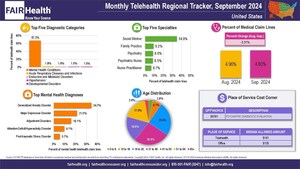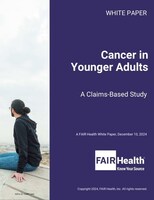Private Insurance Claim Lines with Diagnoses of Lyme Disease Evidence Notable Increases from 2007 to 2016
185 Percent Increase Seen in Rural Areas, 40 Percent in Urban Areas
NEW YORK, July 27, 2017 /PRNewswire-USNewswire/ -- From 2007 to 2016, private insurance claim lines with diagnoses of Lyme disease increased 185 percent in rural areas and 40 percent in urban areas, according to data from FAIR Health, a national, independent, nonprofit organization dedicated to bringing transparency to healthcare costs and health insurance information. Delving into its database of over 23 billion privately billed healthcare claims, FAIR Health uncovered new findings about this common, tick-borne, bacterial illness. For full details of FAIR Health's research on Lyme disease, click here.
Rural and Urban Differences
FAIR Health data from the period 2007-2016 confirm findings by the Centers for Disease Control and Prevention (CDC) that summer is the peak period for Lyme disease diagnoses, as reflected in claim lines with such diagnoses. But rural and urban areas differ. In June and July, claim lines with Lyme disease diagnoses were more common in rural than urban settings. But in the winter and early spring months (December through April), claim lines with Lyme disease diagnoses were reported more often in urban than rural settings.
Age also was a difference between rural and urban settings. In rural settings, claim lines with Lyme disease diagnoses were more common for middle-aged and older people: individuals aged 41 years and above accounted for 62 percent of the rural diagnoses. But, in urban populations, younger individuals accounted for a higher percentage of claim lines with Lyme disease diagnoses.
Spread of Lyme Disease
Although Lyme disease historically has been concentrated in the Northeast and upper Midwest, FAIR Health data suggest that it is spreading geographically. In 2007, claim lines with diagnoses of Lyme disease as a percentage of all claim lines with all diagnoses in the state were highest in the Northeast. The top states, from highest to lowest, were New Jersey, Rhode Island, Connecticut, Massachusetts and New York. But, in 2016, the top states, from highest to lowest, were Rhode Island, New Jersey, Connecticut, North Carolina and New York—with the emergence of North Carolina suggesting significant expansion to a new region.
Lyme Disease and Later Diagnoses
Lyme disease is treatable with antibiotics, but some patients go on to develop post-treatment Lyme disease syndrome (PTLDS), sometimes called chronic Lyme disease, with long-term symptoms such as fatigue, muscle and joint pain and cognitive issues. Autoimmunity has been suggested as a factor in PTLDS. FAIR Health performed a retrospective longitudinal study, examining private insurance claims from a statistically significant cohort of individuals from 2013 to 2017. For patients who had a Lyme disease diagnosis, the most prevalent subsequent diagnoses were:
- Joint pain (e.g., dorsalgia, low back pain, hip and knee pain);
- General symptoms of chronic fatigue and other fatigue;
- Soft tissue disorders (e.g., myalgia, neuralgia, fibromyalgia); and
- Hypothyroidism.
Across age groups, patients with Lyme disease were generally more likely to develop these apparently associated diagnoses than all patients in the cohort. Since these diagnoses often have an autoimmune component, FAIR Health data suggest that at least some autoimmune diagnoses correlate with Lyme disease.
FAIR Health President Robin Gelburd commented: "Lyme disease is growing as a public health concern. As steward of the nation's largest repository of healthcare claims, FAIR Health offers its data to advance the state of knowledge about this disease."
Follow us on Twitter @FAIRHealth
About FAIR Health
FAIR Health is a national, independent, nonprofit organization dedicated to bringing transparency to healthcare costs and health insurance information through data products, consumer resources and health systems research support. FAIR Health oversees the nation's largest collection of healthcare claims data, which includes a repository of over 23 billion billed medical and dental procedures that reflect the claims experience of over 150 million privately insured individuals, and separate data representing the experience of more than 55 million individuals enrolled in Medicare. Certified by the Centers for Medicare & Medicaid Services (CMS) as a Qualified Entity, FAIR Health receives all of Medicare Parts A, B and D claims data for use in nationwide transparency efforts. FAIR Health licenses its privately billed data and data products—including benchmark modules, data visualizations, custom analytics, episodes of care analytics and market indices—to commercial insurers and self-insurers, employers, hospitals and healthcare systems, government agencies, researchers and others. FAIR Health has earned HITRUST CSF and Service Organization Controls (SOC 2) certifications by meeting the rigorous data security standards of those organizations. As a testament to the reliability and objectivity of FAIR Health data, the data have been incorporated in statutes and regulations around the country and designated as the official, neutral data source for a variety of state health programs, including workers' compensation and personal injury protection (PIP) programs. FAIR Health data serve as an official reference point in support of certain state balance billing laws that protect consumers against bills for surprise out-of-network and emergency services. FAIR Health also uses its database to power a free consumer website available in English and Spanish and as an English/Spanish mobile app, which enable consumers to estimate and plan their healthcare expenditures and offer a rich educational platform on health insurance. The website has been honored by the White House Summit on Smart Disclosure, the Agency for Healthcare Research and Quality (AHRQ), URAC, the eHealthcare Leadership Awards, appPicker, Employee Benefit News and Kiplinger's Personal Finance. FAIR Health also is named a top resource for patients in Elisabeth Rosenthal's new book, An American Sickness: How Healthcare Became Big Business and How You Can Take It Back. For more information on FAIR Health, visit fairhealth.org.
Contact:
Dean Sicoli
Executive Director of Communications and Public Relations
FAIR Health
646-664-1645
[email protected]
SOURCE FAIR Health
Related Links
WANT YOUR COMPANY'S NEWS FEATURED ON PRNEWSWIRE.COM?
Newsrooms &
Influencers
Digital Media
Outlets
Journalists
Opted In






Share this article